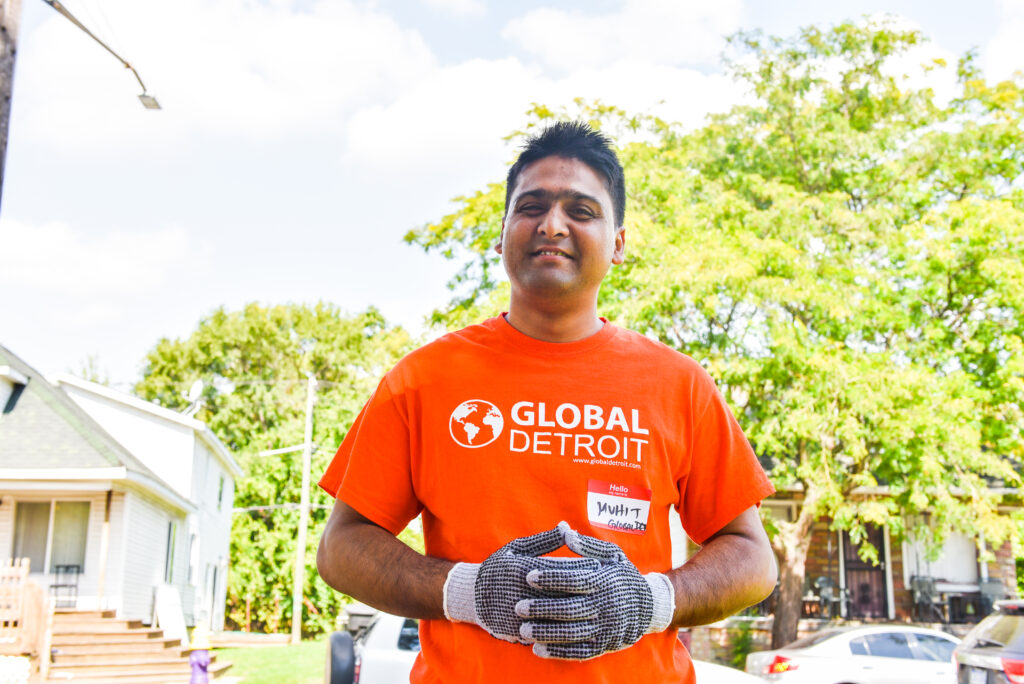In 2015, just a few weeks after Md. Abdul Muhit arrived in the U.S. from Bangladesh by way of London, England, he was hired by Global Detroit to serve as a “trusted connector” to, among other things, assist the growing number of Bangladeshi and Yemeni businesses in the Banglatown neighborhood straddling Detroit and Hamtramck.
Before [Global Detroit’s trusted connectors program] got involved, small business grant programs had very few applicants from Banglatown and Southwest Detroit. Business owners didn’t even know what a grant was. They thought anything they got from anyone, they would have to pay back. I had to have a few conversations with someone before they began to trust the process and decided to apply.
Sometime it’s hard to recognize the importance of a community advocate . . . We get the ball rolling, get residents and business owners the information and connections they need. We help break down barriers and bring partners together. All of these are essential to get the work done.
Global Detroit and the Build from Within Alliance, a national movement of 16 neighborhood-based organizations focused on support resident entrepreneurs as a strategy for economic development and neighborhood revitalization, are releasing a new report, The Power of Trusted Connectors in Micro-Enterprise Development. This report chronicles the expanded use of trusted connectors to better connect low-income entrepreneurs of color and immigrant entrepreneurs with small business grants, loans and technical assistance resources as a critical strategy to move the equity needle on these programs.

Md Abdul Muhit participates in a neighborhood cleanup.
In the wake of the COVID pandemic, there has been a massive shift in the resources made available to small businesses. From the government’s nearly $800 billion Paycheck Protection Program (PPP) to billions of dollars channeled to small businesses from the American Rescue Plan funding made to state and local governments, small businesses have seen a deluge of new grant and loan programs of the size and scale unthinkable prior to the pandemic. Yet, program by program, the racial inequities that exist in small business ownership are repeated in the distribution of these programs.
Low-income entrepreneurs of color and immigrant entrepreneurs, often most in need of these small business supports, are the least able to access them. While sometimes access is restricted by design of the program, too often the barrier to broader utilization of these important resources can be found in the delivery mechanism by which small business opportunities are deployed. Using traditional banks to distribute the Paycheck Protection Program meant that communities with lower banking rates were last to hear about and last to be able to access funding. By the time many immigrant, African American and Latinx entrepreneurs applied for First Round PPP funds, they were exhausted.
The work that Md. Abdul Muhit helped launch at Global Detroit to build a team of “trusted connectors” is a growing and effective practice that is expanding across the nation. Investing in neighborhood residents, community-based organizations and others with established relationships within their underserved communities can help Community Development Financial Institutions (CDFIs), nonprofit lenders, small business support organizations, economic development agencies, state and local government, traditional lenders and others who desire to address racial and ethnic inequities in small business ownership and wealth to reach those underserved communities.
The report chronicles several models by which access to small business opportunities have been expanded to underserved communities through the use of trusted connectors. The report also provides useful action tools that funders and small business providers can utilize to build a trusted connectors program, in addition to setting for the characteristics that make a good trusted connector and potential metrics by which trusted connectors can track success. Finally, the report discusses strategies to expand this practice across America to expand access to and equity in small business resources and opportunities.
Global Detroit will be co-hosting webinars to introduce the research report to Michigan’s small business support organizations on April 8th (this webinar will be co-hosted by RISE Michigan, a statewide network of small business efforts focused on expanding access to underserved communities), national immigrant welcoming programs on May 2nd (this webinar will be co-hosted by Welcoming America) and to small business support organizations across the country in June (that date has not been set, but it will be co-hosted by the Build from Within Alliance).
You can register for the April 8th webinar here and access “The Power of Trusted Connectors in Micro-Enterprise Development” report here.
